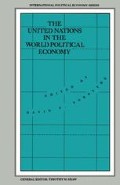Abstract
It has long been argued that world politics is characterised above all by egotistical states operating in an anarchical environment. From the celebrated works of Hans J. Morgenthau to the much praised restatements by David Fromkin and Hedley Bull, commentators have stressed the power drive of nation-states operating without higher authority.1 In these classical treatments emphasis is placed on the independence of states, on their drive to maximise power as both ends and means, and even on the morality of normally evil action when done in pursuit of the national interest.2 Thus the approach to world politics which dominated its study at least in the United States, if not in the West generally, emphasised conflict, competition, and unilateral exercise of power. The sociology of ‘realism’ is especially understandable in the case of Morgenthau who, as a German Jewish émigré, was reacting to the brute force of Nazism as well as the tradition of legalistic liberalism which had dominated much Western scholarship in the 1919–39 period.3
Access this chapter
Tax calculation will be finalised at checkout
Purchases are for personal use only
Preview
Unable to display preview. Download preview PDF.
Notes
Hans J. Morgenthau, Politics Among Nations: The Struggle for Power and Peace (New York: Alfred A. Knopf, 5th edn, 1973).
David Fromkin, The Independence of Nations (New York: Praeger, 1981).
Hedley Bull, The Anarchical Society: A Study of Order in World Politics (New York: Columbia University Press, 1977).
See especially Hans J. Morgenthau, Scientific Man vs. Power Politics (Chicago: University of Chicago Press, 1946).
On legalistic liberalism, see Walter Schiffer, The Legal Community of Mankind (Westport, CT: Greenwood Press, 1954, 1972).
Robert O. Keohane and Joseph S. Nye, Power and Interdependence: World Politics in Transition (Boston: Little, Brown, 1977).
Robert O. Keohane, After Hegemony: Cooperation and Discord in the World Political Economy (Princeton: Princeton University Press, 1984).
Robert Axelrod, The Evolution of Cooperation (New York: Basic Books, 1984).
Kenneth A. Oye (ed.), Cooperation Under Anarchy (Princeton: Princeton University Press, 1986).
Taken from Robert A. Packenham, Liberal America and the Third World: Political Development Ideas in Foreign Aid and Social Science (Princeton: Princeton University Press, 1973), p. 231.
See further David A. Baldwin, ‘Power Analysis and World Politics’, World Politics, vol. 31, no. 2 (January 1979), pp. 161–94.
For a classic statement of this fundamental distinction see Inis L. Claude, The Changing United Nations (New York: Random House, 1967).
For a new work focusing on the United Nations and the allocation of values see Lawrence S. Finkelstein (ed.), Politics in the United Nations System (Durham, NC: Duke University Press, 1988).
Charles Lipson, ‘International Cooperation in Economic and Security Affairs’, World Politics, vol.37, no. 1 (October 1984), pp. 1–23.
Editor information
Editors and Affiliations
Copyright information
© 1989 David P. Forsythe
About this chapter
Cite this chapter
Forsythe, D.P. (1989). Introduction. In: Forsythe, D.P. (eds) The United Nations in the World Political Economy. International Political Economy Series. Palgrave Macmillan, London. https://doi.org/10.1007/978-1-349-20196-9_1
Download citation
DOI: https://doi.org/10.1007/978-1-349-20196-9_1
Publisher Name: Palgrave Macmillan, London
Print ISBN: 978-1-349-20198-3
Online ISBN: 978-1-349-20196-9
eBook Packages: Palgrave Political & Intern. Studies CollectionPolitical Science and International Studies (R0)

